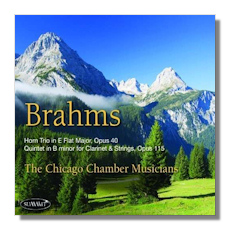
The Internet's Premier Classical Music Source
Related Links
- Brahms Reviews
- Latest Reviews
- More Reviews
-
By Composer
-
Collections
DVD & Blu-ray
Books
Concert Reviews
Articles/Interviews
Software
Audio
Search Amazon
Recommended Links
Site News
 CD Review
CD Review
Johannes Brahms

- Horn Trio in E Flat Major, Op. 40
- Quintet for Clarinet & Strings in B minor, Op. 115
Gail Williams, horn
Larry Combs, clarinet
Chicago Chamber Musicians
Summit Records DCD541
This Horn Trio impressed me in a number of ways. The horn player has a fine tone and her phrasing and attacks are smooth or vigorous as called for. In the first movement, the piano and violin join the horn smoothly, and the movement proceeds with expressive intensity. A couple minutes from the end of the movement there is a careful and effective "stepping" pace before it intensifies; and there is a quiet softness at the end.
In the Scherzo I noticed some emphatic playing by the pianist. The sound of the piano is dominant at the expense of the violin, which I think should have made itself heard better (unless this is a matter of mike placement.) The tempos are satisfying; there is a lilting effect at one point, as well as a nice decrescendo. The Adagio Mesto, which is a lament for the loss of Brahms' mother, opens with an unmistakable dirge, but this is not sustained to excess. The Allegro con brio finale is well varied in intensity.
Brahms Clarinet Quintet is one of his very late works and is sometimes called elegiac, even "singularly elegiac." In previous encounters with it I have tended to find it mellow, and I like it that way, so the present performance came as somewhat of a surprise to me. If you are looking for comfortable, even languorous, pacing in this work, this performance may not be for you. The Chicago Chamber Musicians bring out Brahms' intensity and, to be sure, Brahms certainly can be intense. To contrast their approach with another, the Boston Chamber Music Society, especially in the opening movement, the Boston players alternate intensity with a gentle, relaxed easing off. The Chicago players never seem completely relaxed, even in softer and quieter passages; although their pace is not by any means driven, they maintain a more steady level of intensity in their playing.
What I just wrote is less the case in the Adagio. There is quietness here, though a tight, steady line is maintained, and some intensity as well. There is also beautiful clarinet playing, here and throughout the work. To my ears, the Andantino is the most satisfying movement. It is vigorous; it scampers; there is strong pizzicato against excellent clarinet playing. The finale is intense.
Recommended especially for the Horn Trio and for the horn and clarinet playing.
Copyright © 2010, R. James Tobin





















